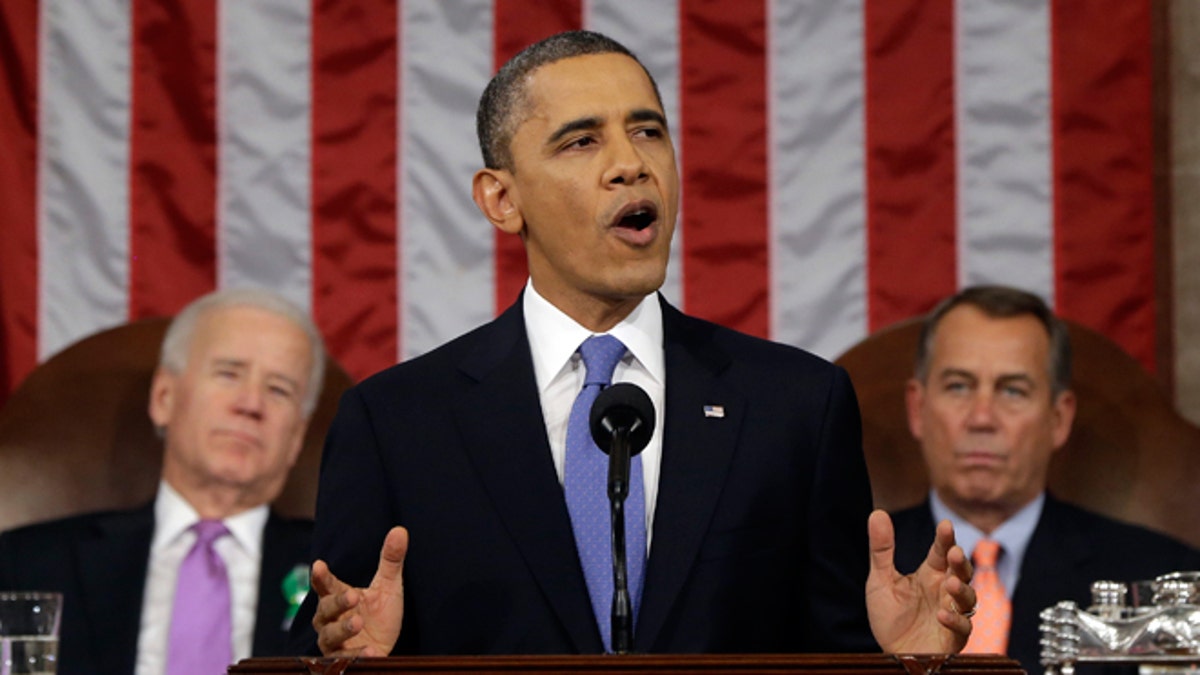
FILE -- Feb. 12, 2013: President Obama, flanked by Vice President Joe Biden and House Speaker John Boehner of Ohio, giving his State of the Union address during a joint session of Congress on Capitol Hill in Washington. (AP Photo/Charles Dharapak, File-Pool)
Here’s your scorecard for Tuesday night when you watch President Obama deliver his fifth State of the Union address on Fox News.
Obama will walk into the House Chamber amidst a flurry of bad press and with a 42 percent approval rating, according to the latest Gallup poll.
His recent interview with The New Yorker magazine paints the picture of a president who has all but given up the ghost on his last three years in office.
[pullquote]
We learned from the piece that Obama has spoken with prominent historians about the power of what Teddy Roosevelt called “The Bully Pulpit” – the unique platform the president has to advocate for his agenda.
The president knows the power a single speech can have to recapture the political agenda and change the media narrative.
Some like presidential speechwriter Peggy Noonan believe the president may have exhausted the limits of that power.
In a recent column for the Wall Street Journal, Noonan writes:
“No one is really listening to the President now. He has been for five years a non-stop wind-up talk machine. Most of it has been facile, bland, the same rounded words and rounded sentiments, the same soft accusations and excuses.”
I’m not so sure.
2014 will be a vitally important year for the Obama administration’s foreign policy.
In Afghanistan, the president has promised to end the longest war in American history by bringing the troops home by the end of the year. After 13 years at war, one should not underestimate how eager the American people are to move on from that bloody and costly conflict.
Despite strong opposition from even some members of his own party, the president and Secretary of State John Kerry brokered a deal with Iran last year to restrict their nuclear program in exchange for easing the crippling economic sanctions on their country. By mid-year, we will have a clear sense of whether or not the deal was a success.
On domestic policy, the president’s signature legislative achievement – the Affordable Care Act aka “ObamaCare” – continues to be the favorite political cudgel of the Republicans.
However, we learned last week that the program is beginning to work as predicted.
The Department of Health and Human Services reports that 3 million people have signed up in the private insurance markets so far. Eight hundred thousand of those were in January 2014, bringing the administration close to its goal of 1.1 new million signups by February 1.
The unemployment rate has fallen to 6.7 percent – the lowest in four years.
The housing market is rebounding.
The stock market is booming. And the federal budget deficit continues to shrink just as it has for the last three years under the president’s leadership.
Still, the president faces many challenges.
Not the least of which are Republicans in the House and the Senate who are hell-bent on continuing their unprecedented obstructionism and determined to run out the clock on the Obama presidency.
Combined with hammering away on the failures of “ObamaCare,” Republicans see this as their best way to win back control of the Senate in November.
The ambitious goals laid out by President Obama in last year’s State of the Union address – immigration reform, gun control, action on climate change – have been hopelessly stalled by political reality.
That is not likely to change in the coming months.
There may, however, be new opportunities for bipartisan solutions to pressing national problems 2014.
The most promising of these opportunities is to reform the corporate tax code – an idea which has received support from the administration and Congressional leaders of both parties.
There is also bipartisan legislation in the Congress to establish a fund to rebuild America’s crumbling infrastructure to spur economic growth and create employment opportunities.
And earlier this month, the president followed up on a proposal he announced in his 2013 State of the Union to establish “promise zones” in America’s poorest neighborhoods.
In announcing the first five of these promise zones -- in San Antonio, Los Angeles, Philadelphia, Southeastern Kentucky and the Choctaw Nation of Oklahoma -- the White House says it is “partnering with local communities and businesses to create jobs, increase economic security, expand educational opportunities, increase access to quality, affordable housing and improve public safety.”
As Winston Churchill might say, the challenge for the president Tuesday night will be to dispel the notion that it is not the beginning of the end of his presidency but merely the end of the beginning of his second term.







































